Globalisation: Economic, Cultural, and Ethical Impacts on Marketing
VerifiedAdded on 2023/06/04
|11
|2757
|275
Report
AI Summary
This assignment examines the positive economic, cultural, and ethical impacts of globalisation on marketing, using McDonald's as a case study. It defines globalisation and analyses its economic effects, such as global business development, free trade, and the role of transnational corporations. The report also explores cultural factors, including the impact of diverse cultures and languages, and ethical considerations, such as corporate social responsibility and ethical business operations. The findings highlight the importance of adapting marketing strategies to local cultures and maintaining ethical practices to gain a competitive advantage in the global market. Recommendations for McDonald's include tailoring marketing to host countries, focusing on emerging Asian markets, and adapting the marketing mix to local preferences, with an emphasis on digital platforms and stakeholder communication.
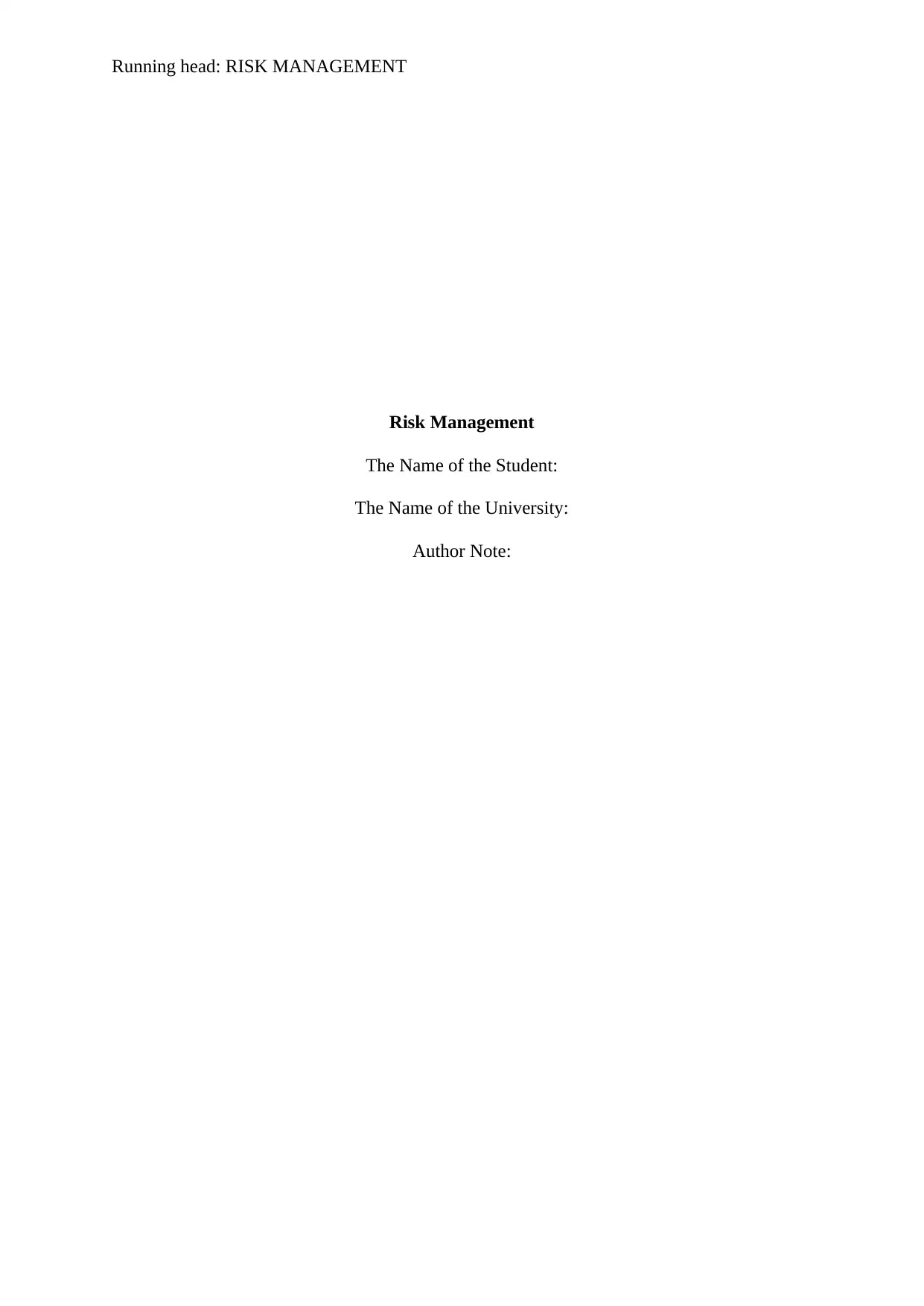
Running head: RISK MANAGEMENT
Risk Management
The Name of the Student:
The Name of the University:
Author Note:
Risk Management
The Name of the Student:
The Name of the University:
Author Note:
Paraphrase This Document
Need a fresh take? Get an instant paraphrase of this document with our AI Paraphraser
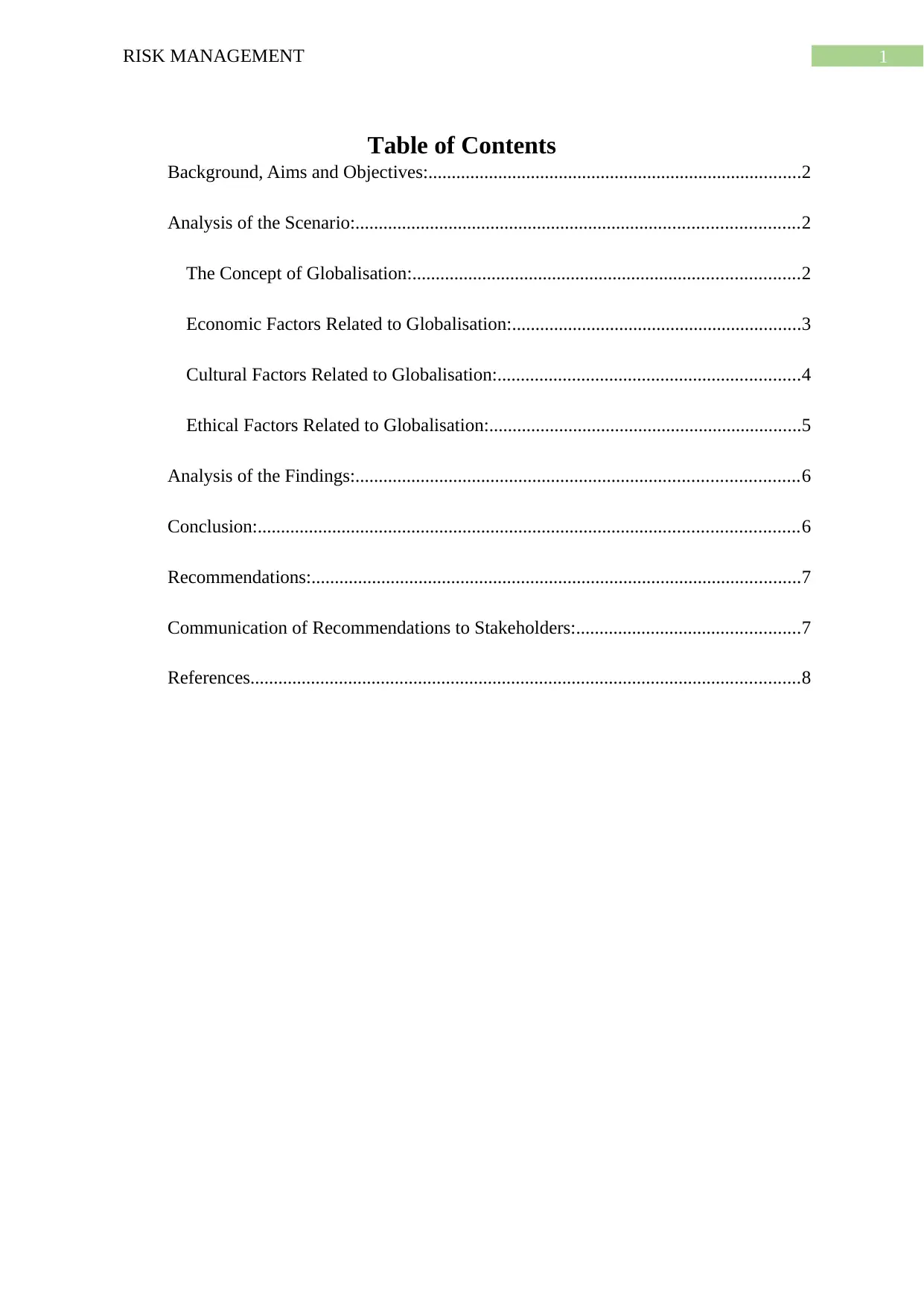
1RISK MANAGEMENT
Table of Contents
Background, Aims and Objectives:................................................................................2
Analysis of the Scenario:...............................................................................................2
The Concept of Globalisation:...................................................................................2
Economic Factors Related to Globalisation:..............................................................3
Cultural Factors Related to Globalisation:.................................................................4
Ethical Factors Related to Globalisation:...................................................................5
Analysis of the Findings:...............................................................................................6
Conclusion:....................................................................................................................6
Recommendations:.........................................................................................................7
Communication of Recommendations to Stakeholders:................................................7
References......................................................................................................................8
Table of Contents
Background, Aims and Objectives:................................................................................2
Analysis of the Scenario:...............................................................................................2
The Concept of Globalisation:...................................................................................2
Economic Factors Related to Globalisation:..............................................................3
Cultural Factors Related to Globalisation:.................................................................4
Ethical Factors Related to Globalisation:...................................................................5
Analysis of the Findings:...............................................................................................6
Conclusion:....................................................................................................................6
Recommendations:.........................................................................................................7
Communication of Recommendations to Stakeholders:................................................7
References......................................................................................................................8
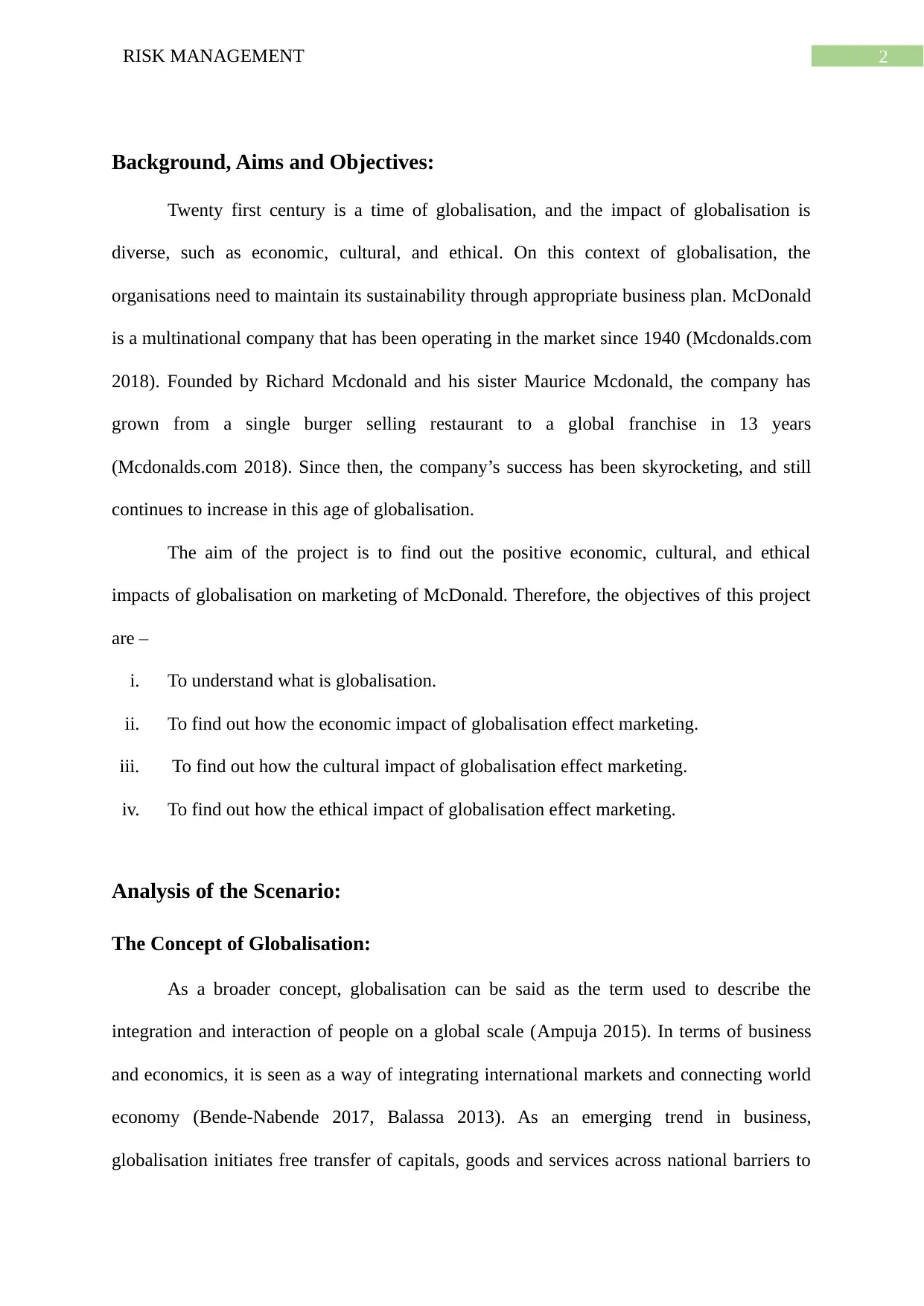
2RISK MANAGEMENT
Background, Aims and Objectives:
Twenty first century is a time of globalisation, and the impact of globalisation is
diverse, such as economic, cultural, and ethical. On this context of globalisation, the
organisations need to maintain its sustainability through appropriate business plan. McDonald
is a multinational company that has been operating in the market since 1940 (Mcdonalds.com
2018). Founded by Richard Mcdonald and his sister Maurice Mcdonald, the company has
grown from a single burger selling restaurant to a global franchise in 13 years
(Mcdonalds.com 2018). Since then, the company’s success has been skyrocketing, and still
continues to increase in this age of globalisation.
The aim of the project is to find out the positive economic, cultural, and ethical
impacts of globalisation on marketing of McDonald. Therefore, the objectives of this project
are –
i. To understand what is globalisation.
ii. To find out how the economic impact of globalisation effect marketing.
iii. To find out how the cultural impact of globalisation effect marketing.
iv. To find out how the ethical impact of globalisation effect marketing.
Analysis of the Scenario:
The Concept of Globalisation:
As a broader concept, globalisation can be said as the term used to describe the
integration and interaction of people on a global scale (Ampuja 2015). In terms of business
and economics, it is seen as a way of integrating international markets and connecting world
economy (Bende-Nabende 2017, Balassa 2013). As an emerging trend in business,
globalisation initiates free transfer of capitals, goods and services across national barriers to
Background, Aims and Objectives:
Twenty first century is a time of globalisation, and the impact of globalisation is
diverse, such as economic, cultural, and ethical. On this context of globalisation, the
organisations need to maintain its sustainability through appropriate business plan. McDonald
is a multinational company that has been operating in the market since 1940 (Mcdonalds.com
2018). Founded by Richard Mcdonald and his sister Maurice Mcdonald, the company has
grown from a single burger selling restaurant to a global franchise in 13 years
(Mcdonalds.com 2018). Since then, the company’s success has been skyrocketing, and still
continues to increase in this age of globalisation.
The aim of the project is to find out the positive economic, cultural, and ethical
impacts of globalisation on marketing of McDonald. Therefore, the objectives of this project
are –
i. To understand what is globalisation.
ii. To find out how the economic impact of globalisation effect marketing.
iii. To find out how the cultural impact of globalisation effect marketing.
iv. To find out how the ethical impact of globalisation effect marketing.
Analysis of the Scenario:
The Concept of Globalisation:
As a broader concept, globalisation can be said as the term used to describe the
integration and interaction of people on a global scale (Ampuja 2015). In terms of business
and economics, it is seen as a way of integrating international markets and connecting world
economy (Bende-Nabende 2017, Balassa 2013). As an emerging trend in business,
globalisation initiates free transfer of capitals, goods and services across national barriers to
⊘ This is a preview!⊘
Do you want full access?
Subscribe today to unlock all pages.

Trusted by 1+ million students worldwide
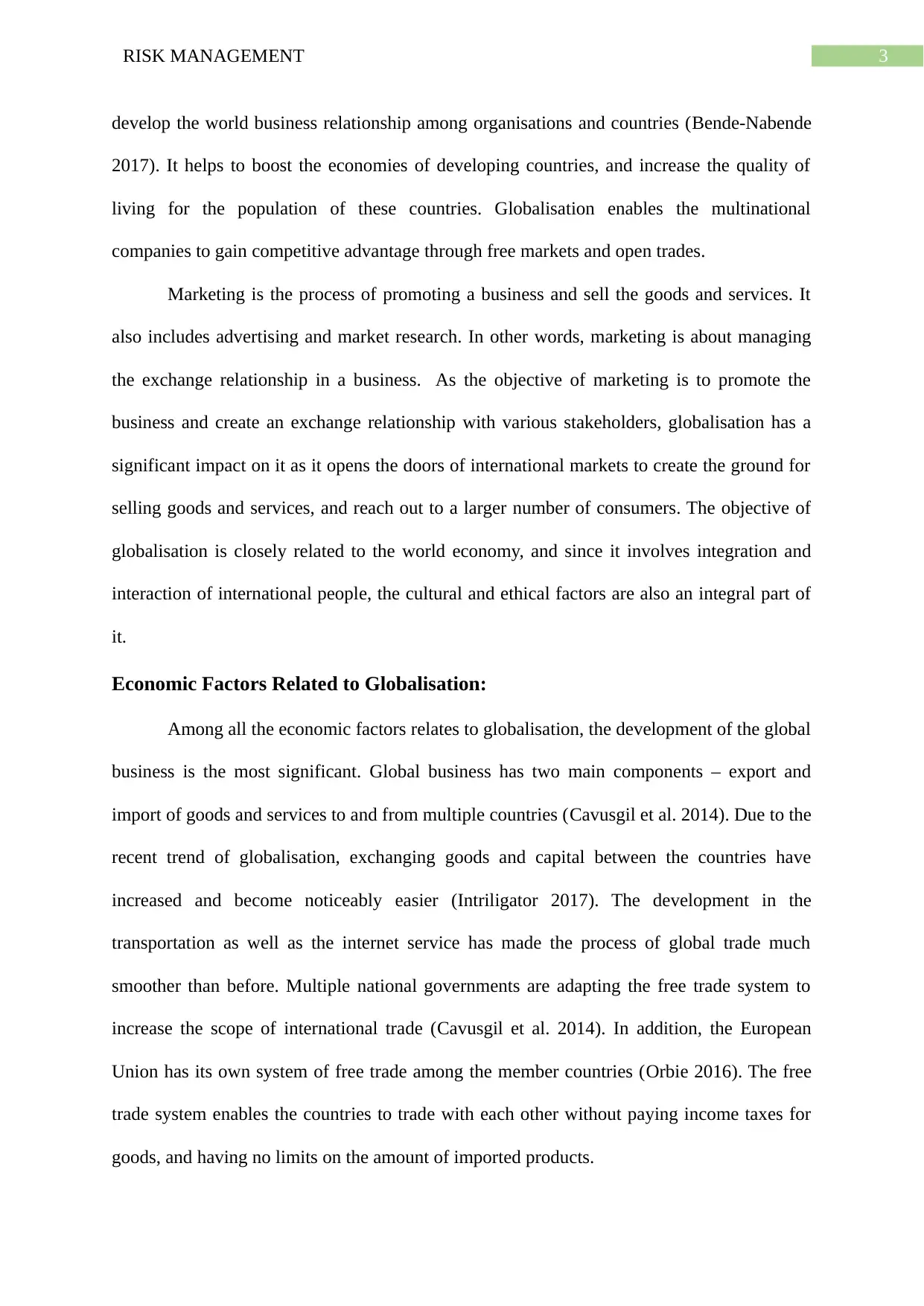
3RISK MANAGEMENT
develop the world business relationship among organisations and countries (Bende-Nabende
2017). It helps to boost the economies of developing countries, and increase the quality of
living for the population of these countries. Globalisation enables the multinational
companies to gain competitive advantage through free markets and open trades.
Marketing is the process of promoting a business and sell the goods and services. It
also includes advertising and market research. In other words, marketing is about managing
the exchange relationship in a business. As the objective of marketing is to promote the
business and create an exchange relationship with various stakeholders, globalisation has a
significant impact on it as it opens the doors of international markets to create the ground for
selling goods and services, and reach out to a larger number of consumers. The objective of
globalisation is closely related to the world economy, and since it involves integration and
interaction of international people, the cultural and ethical factors are also an integral part of
it.
Economic Factors Related to Globalisation:
Among all the economic factors relates to globalisation, the development of the global
business is the most significant. Global business has two main components – export and
import of goods and services to and from multiple countries (Cavusgil et al. 2014). Due to the
recent trend of globalisation, exchanging goods and capital between the countries have
increased and become noticeably easier (Intriligator 2017). The development in the
transportation as well as the internet service has made the process of global trade much
smoother than before. Multiple national governments are adapting the free trade system to
increase the scope of international trade (Cavusgil et al. 2014). In addition, the European
Union has its own system of free trade among the member countries (Orbie 2016). The free
trade system enables the countries to trade with each other without paying income taxes for
goods, and having no limits on the amount of imported products.
develop the world business relationship among organisations and countries (Bende-Nabende
2017). It helps to boost the economies of developing countries, and increase the quality of
living for the population of these countries. Globalisation enables the multinational
companies to gain competitive advantage through free markets and open trades.
Marketing is the process of promoting a business and sell the goods and services. It
also includes advertising and market research. In other words, marketing is about managing
the exchange relationship in a business. As the objective of marketing is to promote the
business and create an exchange relationship with various stakeholders, globalisation has a
significant impact on it as it opens the doors of international markets to create the ground for
selling goods and services, and reach out to a larger number of consumers. The objective of
globalisation is closely related to the world economy, and since it involves integration and
interaction of international people, the cultural and ethical factors are also an integral part of
it.
Economic Factors Related to Globalisation:
Among all the economic factors relates to globalisation, the development of the global
business is the most significant. Global business has two main components – export and
import of goods and services to and from multiple countries (Cavusgil et al. 2014). Due to the
recent trend of globalisation, exchanging goods and capital between the countries have
increased and become noticeably easier (Intriligator 2017). The development in the
transportation as well as the internet service has made the process of global trade much
smoother than before. Multiple national governments are adapting the free trade system to
increase the scope of international trade (Cavusgil et al. 2014). In addition, the European
Union has its own system of free trade among the member countries (Orbie 2016). The free
trade system enables the countries to trade with each other without paying income taxes for
goods, and having no limits on the amount of imported products.
Paraphrase This Document
Need a fresh take? Get an instant paraphrase of this document with our AI Paraphraser
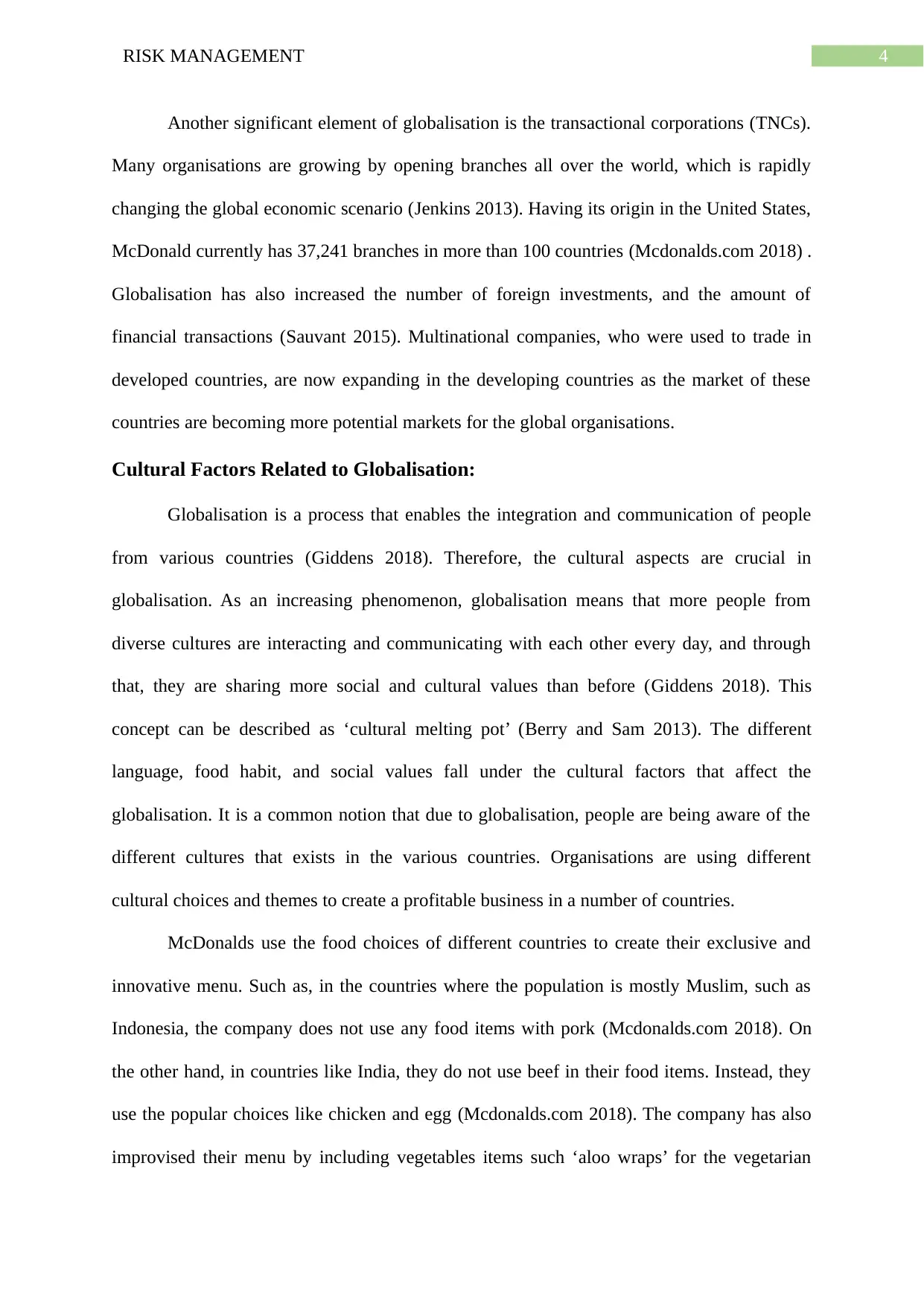
4RISK MANAGEMENT
Another significant element of globalisation is the transactional corporations (TNCs).
Many organisations are growing by opening branches all over the world, which is rapidly
changing the global economic scenario (Jenkins 2013). Having its origin in the United States,
McDonald currently has 37,241 branches in more than 100 countries (Mcdonalds.com 2018) .
Globalisation has also increased the number of foreign investments, and the amount of
financial transactions (Sauvant 2015). Multinational companies, who were used to trade in
developed countries, are now expanding in the developing countries as the market of these
countries are becoming more potential markets for the global organisations.
Cultural Factors Related to Globalisation:
Globalisation is a process that enables the integration and communication of people
from various countries (Giddens 2018). Therefore, the cultural aspects are crucial in
globalisation. As an increasing phenomenon, globalisation means that more people from
diverse cultures are interacting and communicating with each other every day, and through
that, they are sharing more social and cultural values than before (Giddens 2018). This
concept can be described as ‘cultural melting pot’ (Berry and Sam 2013). The different
language, food habit, and social values fall under the cultural factors that affect the
globalisation. It is a common notion that due to globalisation, people are being aware of the
different cultures that exists in the various countries. Organisations are using different
cultural choices and themes to create a profitable business in a number of countries.
McDonalds use the food choices of different countries to create their exclusive and
innovative menu. Such as, in the countries where the population is mostly Muslim, such as
Indonesia, the company does not use any food items with pork (Mcdonalds.com 2018). On
the other hand, in countries like India, they do not use beef in their food items. Instead, they
use the popular choices like chicken and egg (Mcdonalds.com 2018). The company has also
improvised their menu by including vegetables items such ‘aloo wraps’ for the vegetarian
Another significant element of globalisation is the transactional corporations (TNCs).
Many organisations are growing by opening branches all over the world, which is rapidly
changing the global economic scenario (Jenkins 2013). Having its origin in the United States,
McDonald currently has 37,241 branches in more than 100 countries (Mcdonalds.com 2018) .
Globalisation has also increased the number of foreign investments, and the amount of
financial transactions (Sauvant 2015). Multinational companies, who were used to trade in
developed countries, are now expanding in the developing countries as the market of these
countries are becoming more potential markets for the global organisations.
Cultural Factors Related to Globalisation:
Globalisation is a process that enables the integration and communication of people
from various countries (Giddens 2018). Therefore, the cultural aspects are crucial in
globalisation. As an increasing phenomenon, globalisation means that more people from
diverse cultures are interacting and communicating with each other every day, and through
that, they are sharing more social and cultural values than before (Giddens 2018). This
concept can be described as ‘cultural melting pot’ (Berry and Sam 2013). The different
language, food habit, and social values fall under the cultural factors that affect the
globalisation. It is a common notion that due to globalisation, people are being aware of the
different cultures that exists in the various countries. Organisations are using different
cultural choices and themes to create a profitable business in a number of countries.
McDonalds use the food choices of different countries to create their exclusive and
innovative menu. Such as, in the countries where the population is mostly Muslim, such as
Indonesia, the company does not use any food items with pork (Mcdonalds.com 2018). On
the other hand, in countries like India, they do not use beef in their food items. Instead, they
use the popular choices like chicken and egg (Mcdonalds.com 2018). The company has also
improvised their menu by including vegetables items such ‘aloo wraps’ for the vegetarian
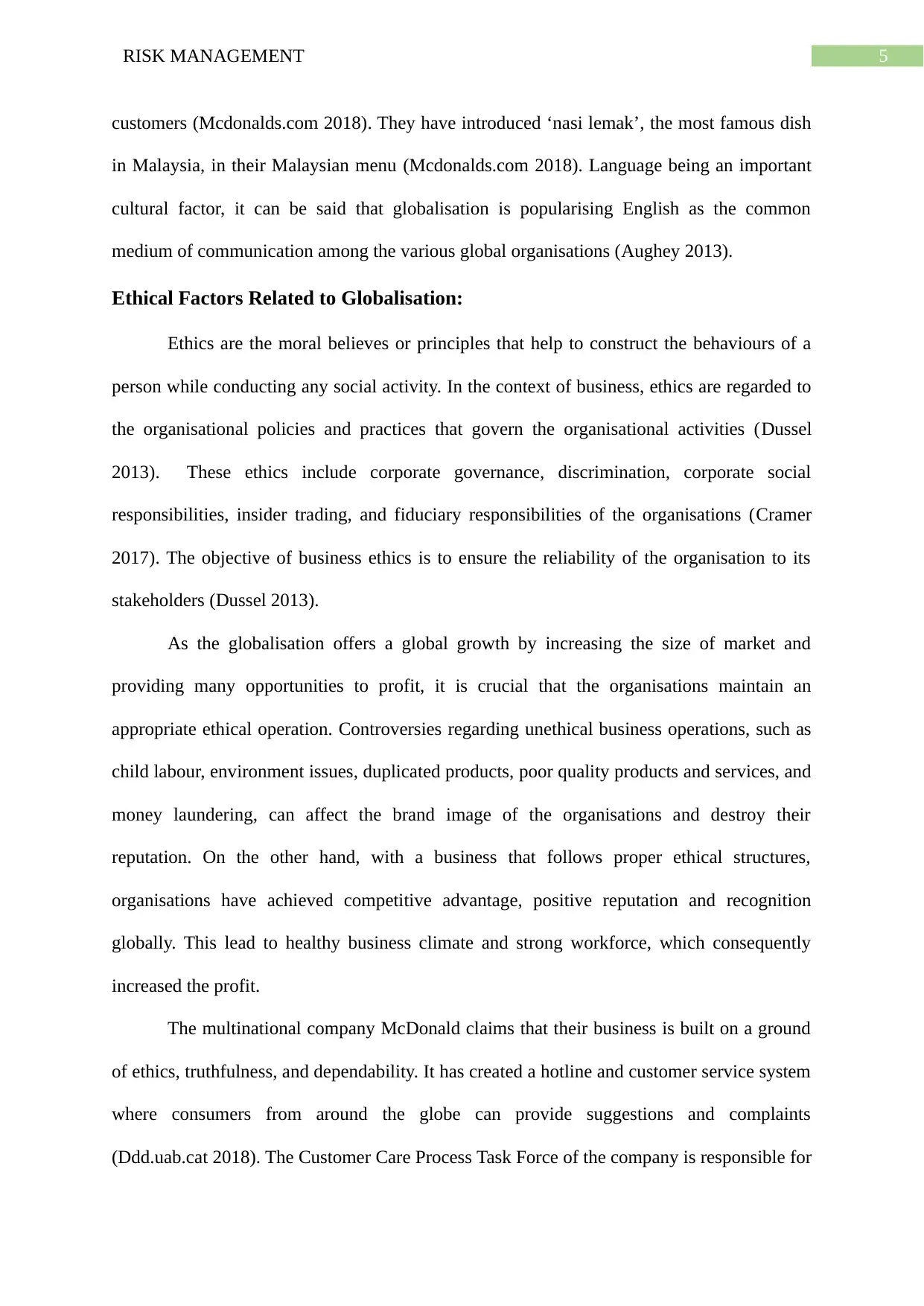
5RISK MANAGEMENT
customers (Mcdonalds.com 2018). They have introduced ‘nasi lemak’, the most famous dish
in Malaysia, in their Malaysian menu (Mcdonalds.com 2018). Language being an important
cultural factor, it can be said that globalisation is popularising English as the common
medium of communication among the various global organisations (Aughey 2013).
Ethical Factors Related to Globalisation:
Ethics are the moral believes or principles that help to construct the behaviours of a
person while conducting any social activity. In the context of business, ethics are regarded to
the organisational policies and practices that govern the organisational activities (Dussel
2013). These ethics include corporate governance, discrimination, corporate social
responsibilities, insider trading, and fiduciary responsibilities of the organisations (Cramer
2017). The objective of business ethics is to ensure the reliability of the organisation to its
stakeholders (Dussel 2013).
As the globalisation offers a global growth by increasing the size of market and
providing many opportunities to profit, it is crucial that the organisations maintain an
appropriate ethical operation. Controversies regarding unethical business operations, such as
child labour, environment issues, duplicated products, poor quality products and services, and
money laundering, can affect the brand image of the organisations and destroy their
reputation. On the other hand, with a business that follows proper ethical structures,
organisations have achieved competitive advantage, positive reputation and recognition
globally. This lead to healthy business climate and strong workforce, which consequently
increased the profit.
The multinational company McDonald claims that their business is built on a ground
of ethics, truthfulness, and dependability. It has created a hotline and customer service system
where consumers from around the globe can provide suggestions and complaints
(Ddd.uab.cat 2018). The Customer Care Process Task Force of the company is responsible for
customers (Mcdonalds.com 2018). They have introduced ‘nasi lemak’, the most famous dish
in Malaysia, in their Malaysian menu (Mcdonalds.com 2018). Language being an important
cultural factor, it can be said that globalisation is popularising English as the common
medium of communication among the various global organisations (Aughey 2013).
Ethical Factors Related to Globalisation:
Ethics are the moral believes or principles that help to construct the behaviours of a
person while conducting any social activity. In the context of business, ethics are regarded to
the organisational policies and practices that govern the organisational activities (Dussel
2013). These ethics include corporate governance, discrimination, corporate social
responsibilities, insider trading, and fiduciary responsibilities of the organisations (Cramer
2017). The objective of business ethics is to ensure the reliability of the organisation to its
stakeholders (Dussel 2013).
As the globalisation offers a global growth by increasing the size of market and
providing many opportunities to profit, it is crucial that the organisations maintain an
appropriate ethical operation. Controversies regarding unethical business operations, such as
child labour, environment issues, duplicated products, poor quality products and services, and
money laundering, can affect the brand image of the organisations and destroy their
reputation. On the other hand, with a business that follows proper ethical structures,
organisations have achieved competitive advantage, positive reputation and recognition
globally. This lead to healthy business climate and strong workforce, which consequently
increased the profit.
The multinational company McDonald claims that their business is built on a ground
of ethics, truthfulness, and dependability. It has created a hotline and customer service system
where consumers from around the globe can provide suggestions and complaints
(Ddd.uab.cat 2018). The Customer Care Process Task Force of the company is responsible for
⊘ This is a preview!⊘
Do you want full access?
Subscribe today to unlock all pages.

Trusted by 1+ million students worldwide
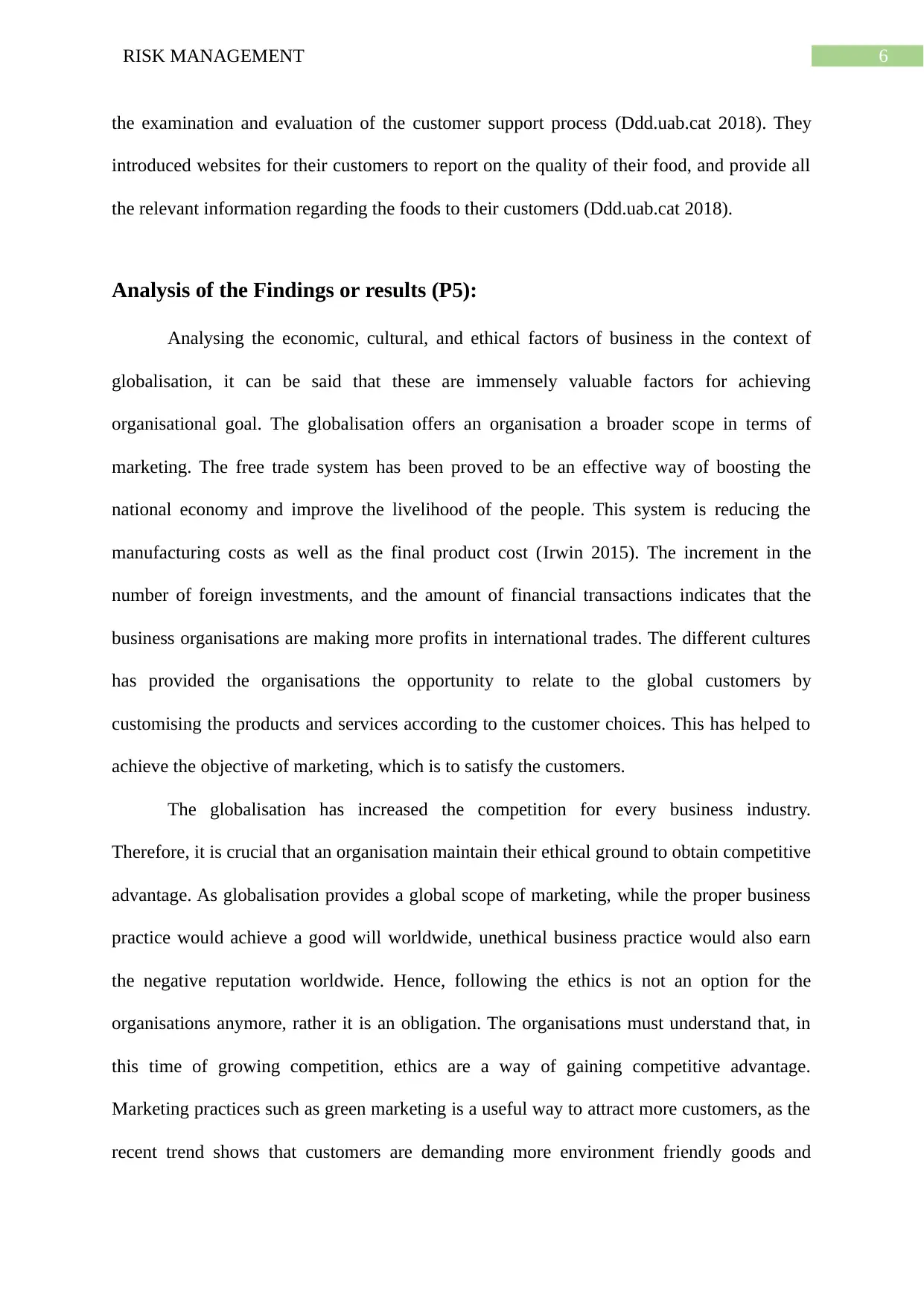
6RISK MANAGEMENT
the examination and evaluation of the customer support process (Ddd.uab.cat 2018). They
introduced websites for their customers to report on the quality of their food, and provide all
the relevant information regarding the foods to their customers (Ddd.uab.cat 2018).
Analysis of the Findings or results (P5):
Analysing the economic, cultural, and ethical factors of business in the context of
globalisation, it can be said that these are immensely valuable factors for achieving
organisational goal. The globalisation offers an organisation a broader scope in terms of
marketing. The free trade system has been proved to be an effective way of boosting the
national economy and improve the livelihood of the people. This system is reducing the
manufacturing costs as well as the final product cost (Irwin 2015). The increment in the
number of foreign investments, and the amount of financial transactions indicates that the
business organisations are making more profits in international trades. The different cultures
has provided the organisations the opportunity to relate to the global customers by
customising the products and services according to the customer choices. This has helped to
achieve the objective of marketing, which is to satisfy the customers.
The globalisation has increased the competition for every business industry.
Therefore, it is crucial that an organisation maintain their ethical ground to obtain competitive
advantage. As globalisation provides a global scope of marketing, while the proper business
practice would achieve a good will worldwide, unethical business practice would also earn
the negative reputation worldwide. Hence, following the ethics is not an option for the
organisations anymore, rather it is an obligation. The organisations must understand that, in
this time of growing competition, ethics are a way of gaining competitive advantage.
Marketing practices such as green marketing is a useful way to attract more customers, as the
recent trend shows that customers are demanding more environment friendly goods and
the examination and evaluation of the customer support process (Ddd.uab.cat 2018). They
introduced websites for their customers to report on the quality of their food, and provide all
the relevant information regarding the foods to their customers (Ddd.uab.cat 2018).
Analysis of the Findings or results (P5):
Analysing the economic, cultural, and ethical factors of business in the context of
globalisation, it can be said that these are immensely valuable factors for achieving
organisational goal. The globalisation offers an organisation a broader scope in terms of
marketing. The free trade system has been proved to be an effective way of boosting the
national economy and improve the livelihood of the people. This system is reducing the
manufacturing costs as well as the final product cost (Irwin 2015). The increment in the
number of foreign investments, and the amount of financial transactions indicates that the
business organisations are making more profits in international trades. The different cultures
has provided the organisations the opportunity to relate to the global customers by
customising the products and services according to the customer choices. This has helped to
achieve the objective of marketing, which is to satisfy the customers.
The globalisation has increased the competition for every business industry.
Therefore, it is crucial that an organisation maintain their ethical ground to obtain competitive
advantage. As globalisation provides a global scope of marketing, while the proper business
practice would achieve a good will worldwide, unethical business practice would also earn
the negative reputation worldwide. Hence, following the ethics is not an option for the
organisations anymore, rather it is an obligation. The organisations must understand that, in
this time of growing competition, ethics are a way of gaining competitive advantage.
Marketing practices such as green marketing is a useful way to attract more customers, as the
recent trend shows that customers are demanding more environment friendly goods and
Paraphrase This Document
Need a fresh take? Get an instant paraphrase of this document with our AI Paraphraser
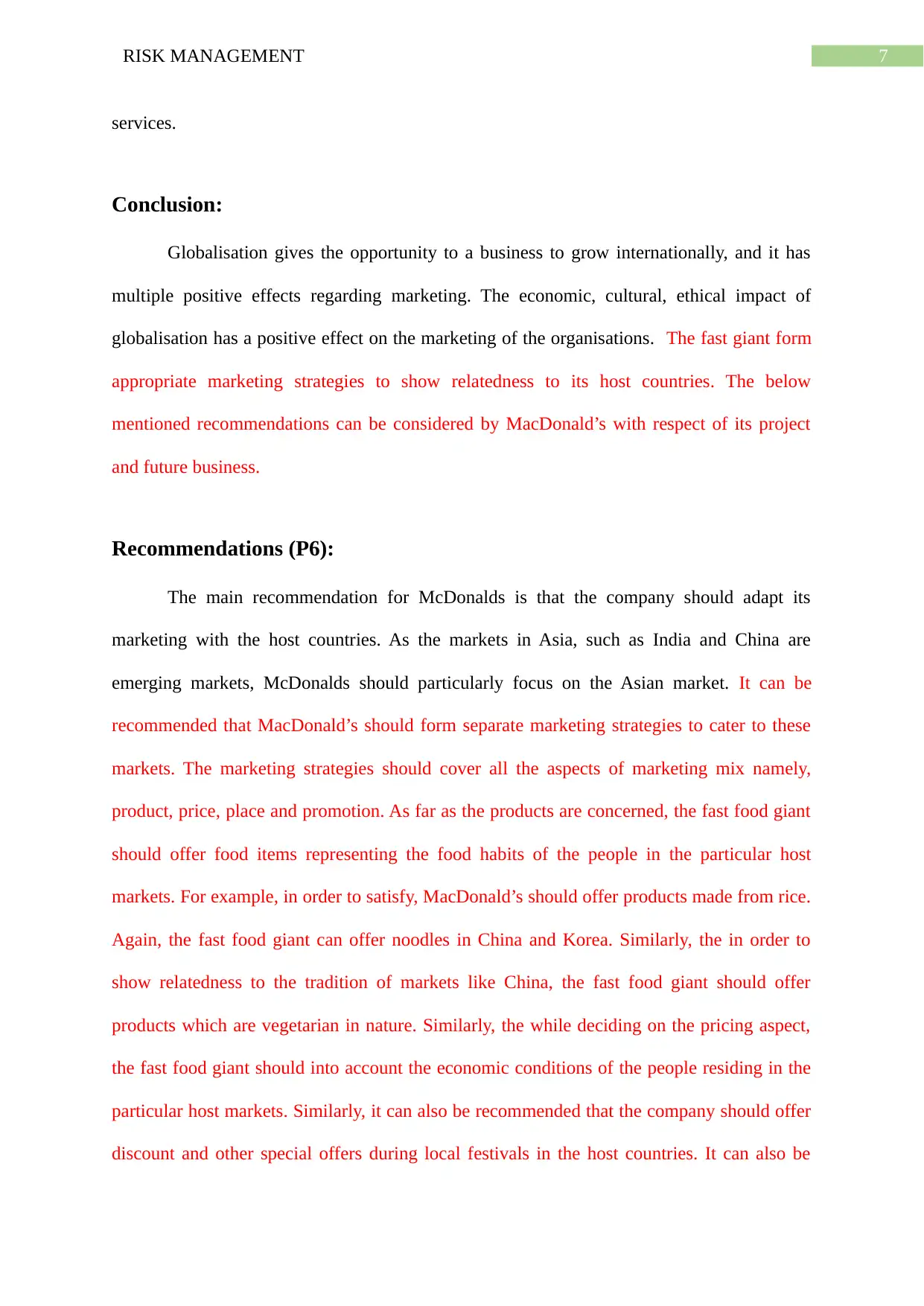
7RISK MANAGEMENT
services.
Conclusion:
Globalisation gives the opportunity to a business to grow internationally, and it has
multiple positive effects regarding marketing. The economic, cultural, ethical impact of
globalisation has a positive effect on the marketing of the organisations. The fast giant form
appropriate marketing strategies to show relatedness to its host countries. The below
mentioned recommendations can be considered by MacDonald’s with respect of its project
and future business.
Recommendations (P6):
The main recommendation for McDonalds is that the company should adapt its
marketing with the host countries. As the markets in Asia, such as India and China are
emerging markets, McDonalds should particularly focus on the Asian market. It can be
recommended that MacDonald’s should form separate marketing strategies to cater to these
markets. The marketing strategies should cover all the aspects of marketing mix namely,
product, price, place and promotion. As far as the products are concerned, the fast food giant
should offer food items representing the food habits of the people in the particular host
markets. For example, in order to satisfy, MacDonald’s should offer products made from rice.
Again, the fast food giant can offer noodles in China and Korea. Similarly, the in order to
show relatedness to the tradition of markets like China, the fast food giant should offer
products which are vegetarian in nature. Similarly, the while deciding on the pricing aspect,
the fast food giant should into account the economic conditions of the people residing in the
particular host markets. Similarly, it can also be recommended that the company should offer
discount and other special offers during local festivals in the host countries. It can also be
services.
Conclusion:
Globalisation gives the opportunity to a business to grow internationally, and it has
multiple positive effects regarding marketing. The economic, cultural, ethical impact of
globalisation has a positive effect on the marketing of the organisations. The fast giant form
appropriate marketing strategies to show relatedness to its host countries. The below
mentioned recommendations can be considered by MacDonald’s with respect of its project
and future business.
Recommendations (P6):
The main recommendation for McDonalds is that the company should adapt its
marketing with the host countries. As the markets in Asia, such as India and China are
emerging markets, McDonalds should particularly focus on the Asian market. It can be
recommended that MacDonald’s should form separate marketing strategies to cater to these
markets. The marketing strategies should cover all the aspects of marketing mix namely,
product, price, place and promotion. As far as the products are concerned, the fast food giant
should offer food items representing the food habits of the people in the particular host
markets. For example, in order to satisfy, MacDonald’s should offer products made from rice.
Again, the fast food giant can offer noodles in China and Korea. Similarly, the in order to
show relatedness to the tradition of markets like China, the fast food giant should offer
products which are vegetarian in nature. Similarly, the while deciding on the pricing aspect,
the fast food giant should into account the economic conditions of the people residing in the
particular host markets. Similarly, it can also be recommended that the company should offer
discount and other special offers during local festivals in the host countries. It can also be
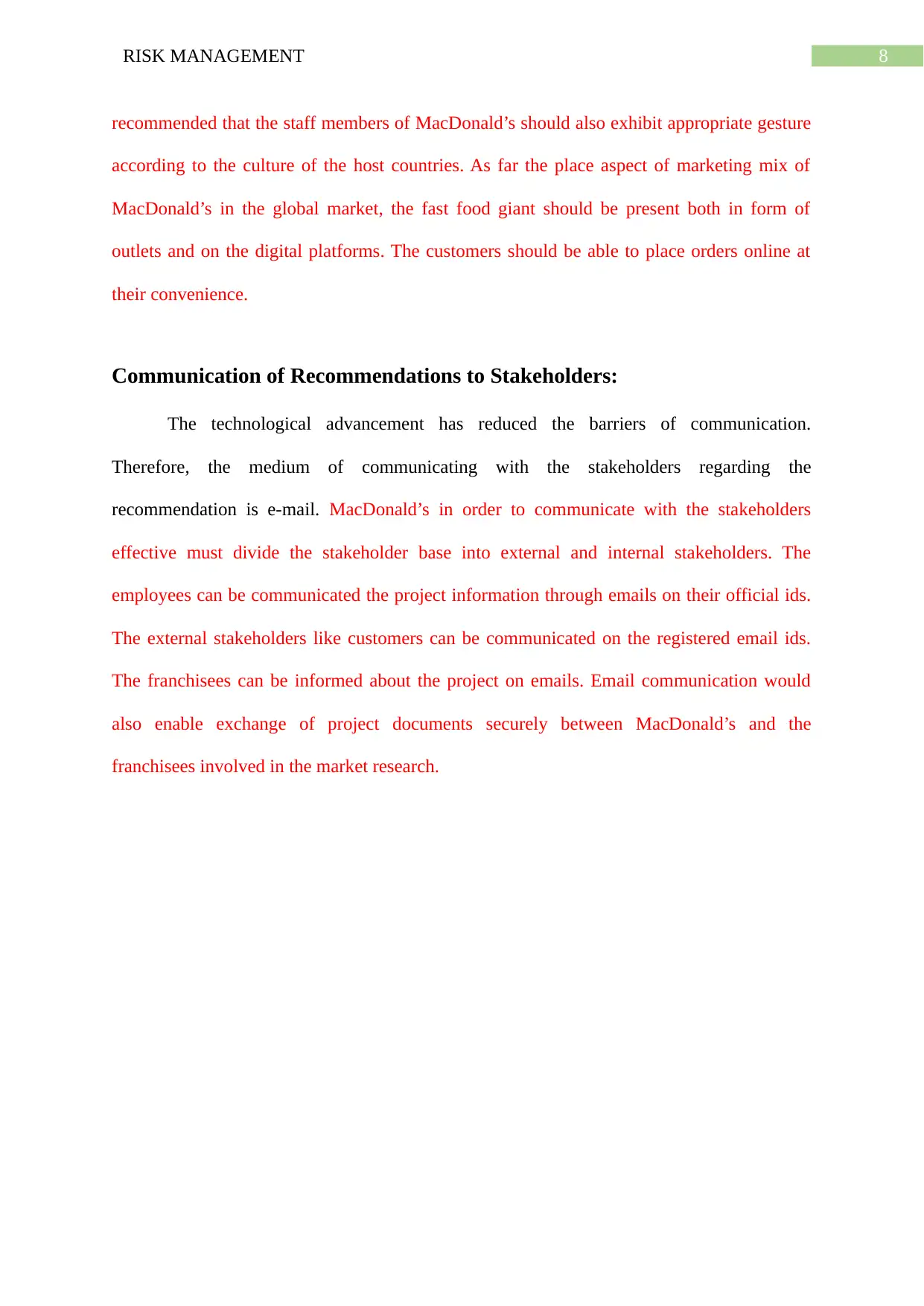
8RISK MANAGEMENT
recommended that the staff members of MacDonald’s should also exhibit appropriate gesture
according to the culture of the host countries. As far the place aspect of marketing mix of
MacDonald’s in the global market, the fast food giant should be present both in form of
outlets and on the digital platforms. The customers should be able to place orders online at
their convenience.
Communication of Recommendations to Stakeholders:
The technological advancement has reduced the barriers of communication.
Therefore, the medium of communicating with the stakeholders regarding the
recommendation is e-mail. MacDonald’s in order to communicate with the stakeholders
effective must divide the stakeholder base into external and internal stakeholders. The
employees can be communicated the project information through emails on their official ids.
The external stakeholders like customers can be communicated on the registered email ids.
The franchisees can be informed about the project on emails. Email communication would
also enable exchange of project documents securely between MacDonald’s and the
franchisees involved in the market research.
recommended that the staff members of MacDonald’s should also exhibit appropriate gesture
according to the culture of the host countries. As far the place aspect of marketing mix of
MacDonald’s in the global market, the fast food giant should be present both in form of
outlets and on the digital platforms. The customers should be able to place orders online at
their convenience.
Communication of Recommendations to Stakeholders:
The technological advancement has reduced the barriers of communication.
Therefore, the medium of communicating with the stakeholders regarding the
recommendation is e-mail. MacDonald’s in order to communicate with the stakeholders
effective must divide the stakeholder base into external and internal stakeholders. The
employees can be communicated the project information through emails on their official ids.
The external stakeholders like customers can be communicated on the registered email ids.
The franchisees can be informed about the project on emails. Email communication would
also enable exchange of project documents securely between MacDonald’s and the
franchisees involved in the market research.
⊘ This is a preview!⊘
Do you want full access?
Subscribe today to unlock all pages.

Trusted by 1+ million students worldwide
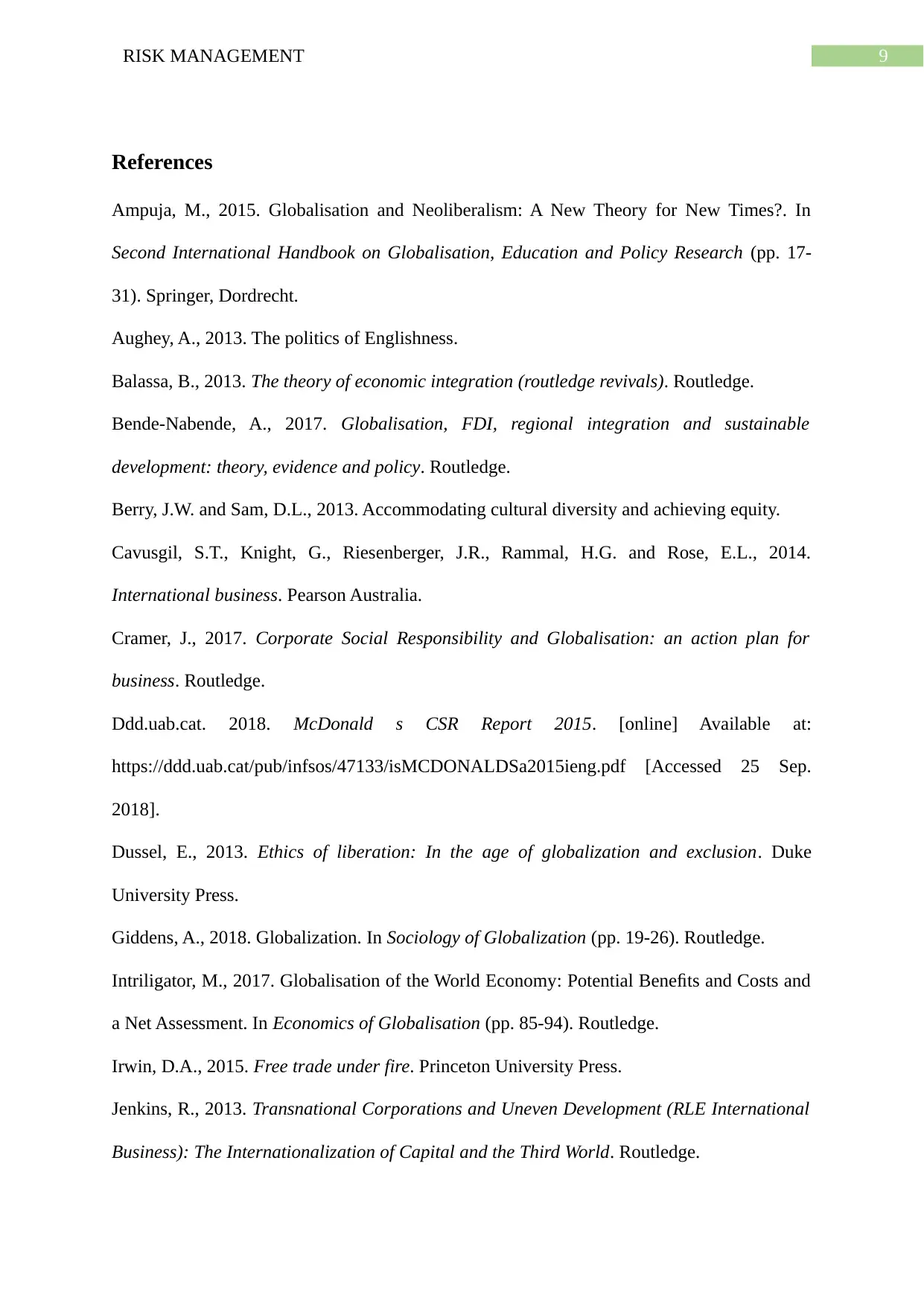
9RISK MANAGEMENT
References
Ampuja, M., 2015. Globalisation and Neoliberalism: A New Theory for New Times?. In
Second International Handbook on Globalisation, Education and Policy Research (pp. 17-
31). Springer, Dordrecht.
Aughey, A., 2013. The politics of Englishness.
Balassa, B., 2013. The theory of economic integration (routledge revivals). Routledge.
Bende-Nabende, A., 2017. Globalisation, FDI, regional integration and sustainable
development: theory, evidence and policy. Routledge.
Berry, J.W. and Sam, D.L., 2013. Accommodating cultural diversity and achieving equity.
Cavusgil, S.T., Knight, G., Riesenberger, J.R., Rammal, H.G. and Rose, E.L., 2014.
International business. Pearson Australia.
Cramer, J., 2017. Corporate Social Responsibility and Globalisation: an action plan for
business. Routledge.
Ddd.uab.cat. 2018. McDonald s CSR Report 2015. [online] Available at:
https://ddd.uab.cat/pub/infsos/47133/isMCDONALDSa2015ieng.pdf [Accessed 25 Sep.
2018].
Dussel, E., 2013. Ethics of liberation: In the age of globalization and exclusion. Duke
University Press.
Giddens, A., 2018. Globalization. In Sociology of Globalization (pp. 19-26). Routledge.
Intriligator, M., 2017. Globalisation of the World Economy: Potential Benefits and Costs and
a Net Assessment. In Economics of Globalisation (pp. 85-94). Routledge.
Irwin, D.A., 2015. Free trade under fire. Princeton University Press.
Jenkins, R., 2013. Transnational Corporations and Uneven Development (RLE International
Business): The Internationalization of Capital and the Third World. Routledge.
References
Ampuja, M., 2015. Globalisation and Neoliberalism: A New Theory for New Times?. In
Second International Handbook on Globalisation, Education and Policy Research (pp. 17-
31). Springer, Dordrecht.
Aughey, A., 2013. The politics of Englishness.
Balassa, B., 2013. The theory of economic integration (routledge revivals). Routledge.
Bende-Nabende, A., 2017. Globalisation, FDI, regional integration and sustainable
development: theory, evidence and policy. Routledge.
Berry, J.W. and Sam, D.L., 2013. Accommodating cultural diversity and achieving equity.
Cavusgil, S.T., Knight, G., Riesenberger, J.R., Rammal, H.G. and Rose, E.L., 2014.
International business. Pearson Australia.
Cramer, J., 2017. Corporate Social Responsibility and Globalisation: an action plan for
business. Routledge.
Ddd.uab.cat. 2018. McDonald s CSR Report 2015. [online] Available at:
https://ddd.uab.cat/pub/infsos/47133/isMCDONALDSa2015ieng.pdf [Accessed 25 Sep.
2018].
Dussel, E., 2013. Ethics of liberation: In the age of globalization and exclusion. Duke
University Press.
Giddens, A., 2018. Globalization. In Sociology of Globalization (pp. 19-26). Routledge.
Intriligator, M., 2017. Globalisation of the World Economy: Potential Benefits and Costs and
a Net Assessment. In Economics of Globalisation (pp. 85-94). Routledge.
Irwin, D.A., 2015. Free trade under fire. Princeton University Press.
Jenkins, R., 2013. Transnational Corporations and Uneven Development (RLE International
Business): The Internationalization of Capital and the Third World. Routledge.
Paraphrase This Document
Need a fresh take? Get an instant paraphrase of this document with our AI Paraphraser
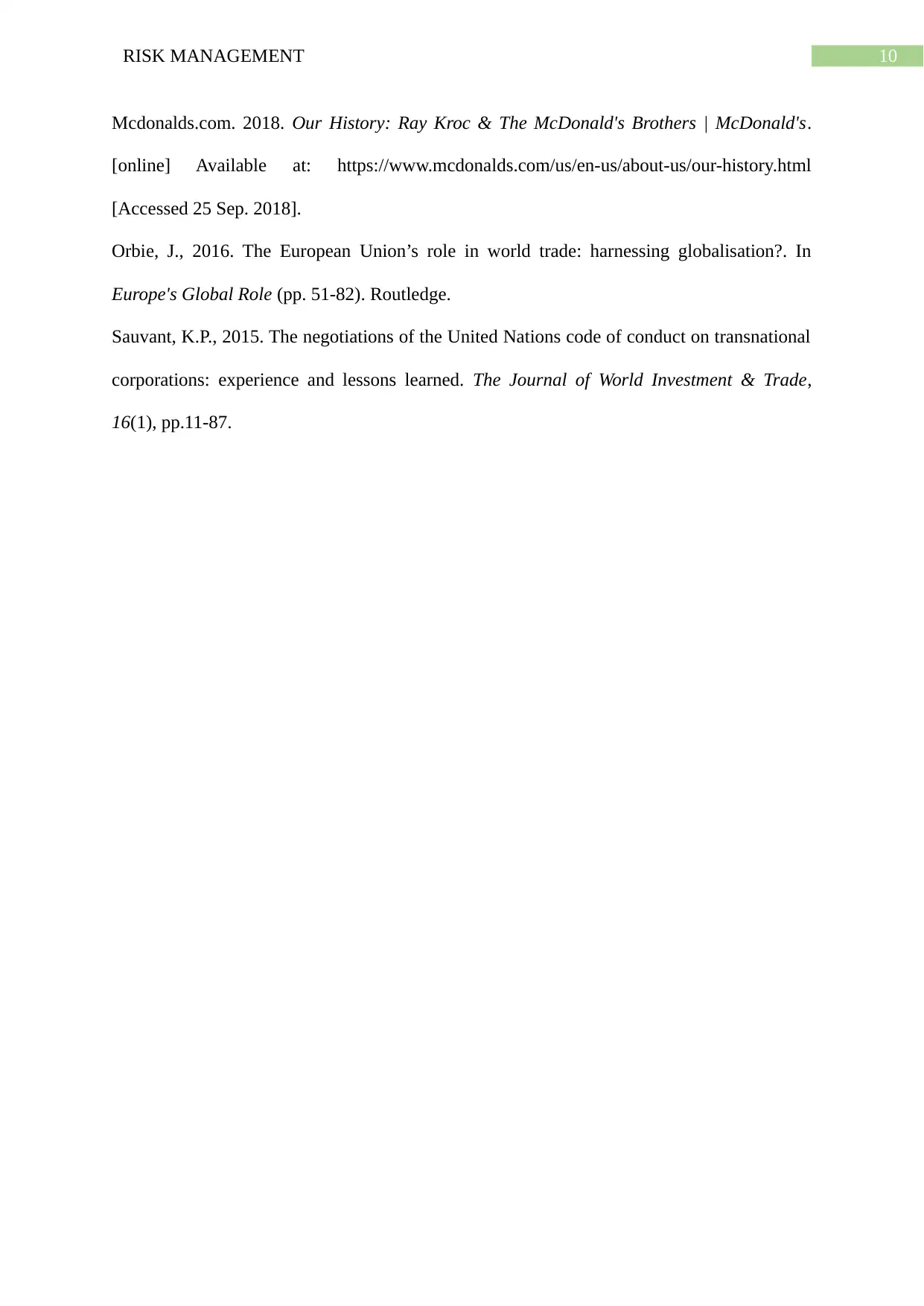
10RISK MANAGEMENT
Mcdonalds.com. 2018. Our History: Ray Kroc & The McDonald's Brothers | McDonald's.
[online] Available at: https://www.mcdonalds.com/us/en-us/about-us/our-history.html
[Accessed 25 Sep. 2018].
Orbie, J., 2016. The European Union’s role in world trade: harnessing globalisation?. In
Europe's Global Role (pp. 51-82). Routledge.
Sauvant, K.P., 2015. The negotiations of the United Nations code of conduct on transnational
corporations: experience and lessons learned. The Journal of World Investment & Trade,
16(1), pp.11-87.
Mcdonalds.com. 2018. Our History: Ray Kroc & The McDonald's Brothers | McDonald's.
[online] Available at: https://www.mcdonalds.com/us/en-us/about-us/our-history.html
[Accessed 25 Sep. 2018].
Orbie, J., 2016. The European Union’s role in world trade: harnessing globalisation?. In
Europe's Global Role (pp. 51-82). Routledge.
Sauvant, K.P., 2015. The negotiations of the United Nations code of conduct on transnational
corporations: experience and lessons learned. The Journal of World Investment & Trade,
16(1), pp.11-87.
1 out of 11
Related Documents
Your All-in-One AI-Powered Toolkit for Academic Success.
+13062052269
info@desklib.com
Available 24*7 on WhatsApp / Email
![[object Object]](/_next/static/media/star-bottom.7253800d.svg)
Unlock your academic potential
Copyright © 2020–2025 A2Z Services. All Rights Reserved. Developed and managed by ZUCOL.





